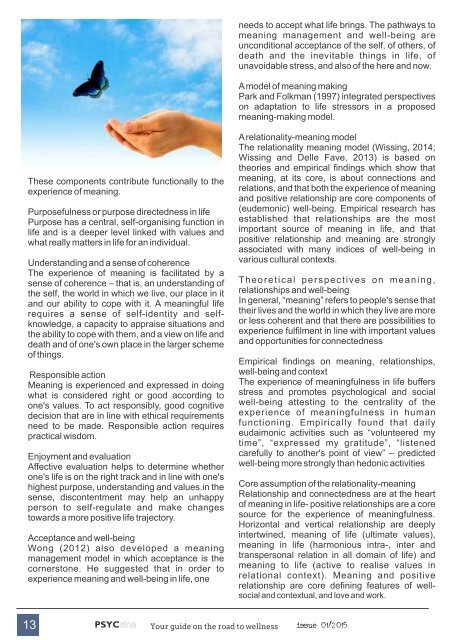PSYC groeptaak
- No tags were found...
You also want an ePaper? Increase the reach of your titles
YUMPU automatically turns print PDFs into web optimized ePapers that Google loves.
needs to accept what life brings. The pathways to<br />
meaning management and well-being are<br />
unconditional acceptance of the self, of others, of<br />
death and the inevitable things in life, of<br />
unavoidable stress, and also of the here and now.<br />
A model of meaning making<br />
Park and Folkman (1997) integrated perspectives<br />
on adaptation to life stressors in a proposed<br />
meaning-making model.<br />
These components contribute functionally to the<br />
experience of meaning.<br />
Purposefulness or purpose directedness in life<br />
Purpose has a central, self-organising function in<br />
life and is a deeper level linked with values and<br />
what really matters in life for an individual.<br />
Understanding and a sense of coherence<br />
The experience of meaning is facilitated by a<br />
sense of coherence – that is, an understanding of<br />
the self, the world in which we live, our place in it<br />
and our ability to cope with it. A meaningful life<br />
requires a sense of self-identity and selfknowledge,<br />
a capacity to appraise situations and<br />
the ability to cope with them, and a view on life and<br />
death and of one's own place in the larger scheme<br />
of things.<br />
Responsible action<br />
Meaning is experienced and expressed in doing<br />
what is considered right or good according to<br />
one's values. To act responsibly, good cognitive<br />
decision that are in line with ethical requirements<br />
need to be made. Responsible action requires<br />
practical wisdom.<br />
Enjoyment and evaluation<br />
Affective evaluation helps to determine whether<br />
one's life is on the right track and in line with one's<br />
highest purpose, understanding and values.in the<br />
sense, discontentment may help an unhappy<br />
person to self-regulate and make changes<br />
towards a more positive life trajectory.<br />
Acceptance and well-being<br />
Wong (2012) also developed a meaning<br />
management model in which acceptance is the<br />
cornerstone. He suggested that in order to<br />
experience meaning and well-being in life, one<br />
A relationality-meaning model<br />
The relationality meaning model (Wissing, 2014;<br />
Wissing and Delle Fave, 2013) is based on<br />
theories and empirical findings which show that<br />
meaning, at its core, is about connections and<br />
relations, and that both the experience of meaning<br />
and positive relationship are core components of<br />
(eudemonic) well-being. Empirical research has<br />
established that relationships are the most<br />
important source of meaning in life, and that<br />
positive relationship and meaning are strongly<br />
associated with many indices of well-being in<br />
various cultural contexts.<br />
T h e o r e t i c a l p e r s p e c t i v e s o n m e a n i n g ,<br />
relationships and well-being<br />
In general, “meaning” refers to people's sense that<br />
their lives and the world in which they live are more<br />
or less coherent and that there are possibilities to<br />
experience fulfilment in line with important values<br />
and opportunities for connectedness<br />
Empirical findings on meaning, relationships,<br />
well-being and context<br />
The experience of meaningfulness in life buffers<br />
stress and promotes psychological and social<br />
well-being attesting to the centrality of the<br />
experience of meaningfulness in human<br />
functioning. Empirically found that daily<br />
eudaimonic activities such as “volunteered my<br />
time”, “expressed my gratitude”, “listened<br />
carefully to another's point of view” – predicted<br />
well-being more strongly than hedonic activities<br />
Core assumption of the relationality-meaning<br />
Relationship and connectedness are at the heart<br />
of meaning in life- positive relationships are a core<br />
source for the experience of meaningfulness.<br />
Horizontal and vertical relationship are deeply<br />
intertwined, meaning of life (ultimate values),<br />
meaning in life (harmonious intra-, inter and<br />
transpersonal relation in all domain of life) and<br />
meaning to life (active to realise values in<br />
relational context). Meaning and positive<br />
relationship are core defining features of wellsocial<br />
and contextual, and love and work.<br />
13<br />
<strong>PSYC</strong>zine Your guide on the road to wellness issue 01/2015


